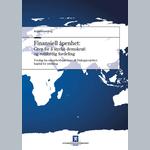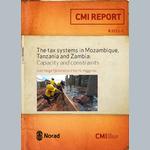Africa loses big money on tax breaks
In Tanzania, only 500 000 of 44 million people are registered as tax payers. In neighbouring Mozambique, corresponding numbers are 1 out of 25 million. Tanzania and Mozambique are not unique. African states miss out on extensive tax revenue because of lacking tax compliance, poorly developed tax administrations and tax breaks for the rich and powerful. The International Centre for Tax and Development (ICTD) wants to change this.
ICTD is a global policy research network dealing with the political economy of taxation policies and practices in relation to the poorer parts of the world. Odd-Helge Fjeldstad, senior researcher at Chr. Michelsen Institute, contributed to initiate the network and is research director of ICTD.
-Currently, African states are in a “race to the bottom”. They try to attract foreign investors through generous tax breaks, but tax treatments rarely influence a company’s decision to invest in a country. Foreign investors often see tax breaks as a bonus, says Fjeldstad.
Tax builds countries
Tax revenue can build states and institutions. Governments in poor countries can raise domestic financial resources and manage them in ways that enhance public services and promote the state’s legitimacy. International donors have not acknowledged this potential.
-International donors have failed to recognize that state building is closely connected to the development of the tax system, says Fjeldstad.
Many African countries receive considerable amounts of aid every year. In Mozambique, the tax revenue per capita was 66 $ in 2008. The corresponding number for aid was 93 $. In Tanzania, tax revenue was 71 $ per capita and aid was 58 $. A better developed tax administration and strategies for collecting taxes, alongside firm legislation, could make these countries more self-sustained.
Research shows that tax breaks in some countries make up as much as 6 percent of GDP. Tax breaks also legitimize tax evasion. Why should you pay, if your neighbour does not? Why should a national company pay taxes when foreign investors do not?
-African states and state administrations should send a clear signal to foreign investors and not tailor legislative frameworks to fit them. Experience shows that foreign companies will invest independent of tax breaks, says Fjeldstad.
Surveying people’s willingness to pay tax
In order to raise tax revenue, the tax administration depends on compliance. Individuals, domestic and foreign companies have to be willing to pay their taxes. Willingness to pay depends on several factors; people need to know that the tax collection system is fair, that everyone pays, that tax evasion is penalized, and most of all that people experience that they get something back in form of public services and public goods.
Currently, ICTD explores tax compliance in eleven African countries. ICTD is partnering with the Afrobarometer, an independent, nonpartisan research project that conducts regular national public attitude surveys, to include questions on tax perception in their 2012 survey. The first results have started to come in, and the study will be completed this year.
-As of now, we know little about people’s views of taxation in Africa. For our new study, we have chosen to analyse a selection of Anglophone and Francophone countries, as well as Portuguese-speaking Mozambique. This survey will provide us with knowledge about people’s attitude towards and willingness to pay tax, and differences between gender, age, professions and income groups, says Fjeldstad.
Publications

Broadening the tax base : Reflections on taxation and state-building in Africa
How taxation can make the authorities more accountable

The tax systems in Mozambique, Tanzania and Zambia: capacity and constraints
Odd-Helge Fjeldstad
Projects

The political-economy of property tax collection in Tanzania

